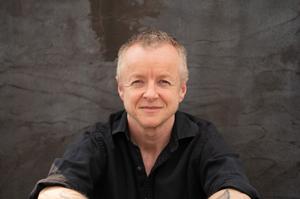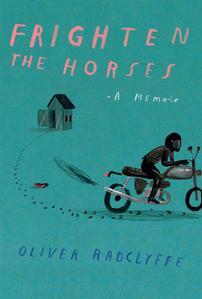
|
|
| Oliver Radclyffe (photo: Lev Rose) |
|
Oliver Radclyffe's work has appeared in the New York Times and Electric Literature. He is the author of Adult Human Male and his memoir, Frighten the Horses (reviewed in this issue), was just published by Roxane Gay Books/Grove Atlantic Press. Radclyffe lives on the Connecticut coast with his four children.
What was different about your two books?
Writing this book took me 10 years. I wrote a manuscript in five years about coming out as a lesbian in mid-life. But by the time it was finished, I was already midway through my transition. When I started sending it out to agents, I pitched it as the first of a two-book series; I would write the transition second. The agents said, that's not going to work.
So I started again from scratch, focusing on my gender and the denial that I had been experiencing. I wrote that book over a three-year period. Got an agent; she started submitting it. We got feedback from editors that they weren't clear who the book was for. I hadn't thought about my audience; I needed to distance myself from that to write what I was writing.
 While that book was out on first submission, Roxane Gay announced she was opening her imprint. I had this thunderbolt moment: What if I rewrote this for Roxane Gay? I'd done her master class on writing through trauma, I'd seen her interview trans people, I knew who she was publicly, I knew the way she thought and what her values were. I thought, I can tell this story to this woman. I wasn't thinking Roxane Gay might buy the book, it was just an exercise in how to fine-tune it. I spent another nine months rewriting.
While that book was out on first submission, Roxane Gay announced she was opening her imprint. I had this thunderbolt moment: What if I rewrote this for Roxane Gay? I'd done her master class on writing through trauma, I'd seen her interview trans people, I knew who she was publicly, I knew the way she thought and what her values were. I thought, I can tell this story to this woman. I wasn't thinking Roxane Gay might buy the book, it was just an exercise in how to fine-tune it. I spent another nine months rewriting.
During resubmissions, I had an essay published in Electric Lit which Patrick Davis from Unbound Edition Press read, and he called me up and said, I want to commission you to write a book of essays. At that point I wasn't sure the memoir was going to be published. So I said okay. We signed the contract, and then Roxane got back to us. There was a minor panic about the timing of publications. Grove said, we can do this, but we need a year's grace between the two books. That meant I had to write the book in three months. So the difference between the two books? One took me 10 years and one took me three months. It was actually really fun to write to a really tight deadline.
Why tell your story?
For the first draft, the starting point was in 2011, when I needed to read books about people who were discovering their queer identities in midlife. They really didn't exist, particularly in my situation: married, masquerading as heterosexual, with kids. I was about to blow up my own life, and I desperately wanted to find somebody who'd been through this before. I'm Gen X; I wasn't going to start going onto Reddit forums. I started looking for books, and they didn't exist. I'd always wanted to write. That old cliché: write the book you want to read.
When I wrote the second draft, about transitioning, the focus shifted from writing for a queer audience to trying to be a bridge. There were so many books at that point written for trans people, I didn't feel the need to add to that canon. I was in a unique position to write to cis people because I had been in essentially a cisgendered heterosexual life for so long. When I first started transitioning, I said to all my friends, please don't hold back on the questions. Anything you want to know, even if you think it might be rude or weird or uncomfortable, ask. That's what I set out to do, but not in a didactic way.
Legitimately, I am less vulnerable than a lot of trans writers. I'm trans masculine, I'm white, I'm comfortably off, I live in this lovely house in the Connecticut suburbs with my children. I am not in a position of extreme danger and vulnerability. When I made the choice to write about some of the more intimate details, I thought, I'm going to do this because I can. I wanted people to understand that transness is not ideological. It's incredibly physical. The only way to show this is by going into those details about my body. It's not something you can think your way out of, or intellectualize your way out of--it's your body that is leading this journey. I leaned into that. I hope that other trans people do not feel that I have opened a door to invite cis people to ask those questions unsolicited! Because obviously it is curated and controlled by me, the writer. But I did feel it was important to go there.
The timeline in your writing jumps around.
Those jumps weren't there originally. In the early drafts I didn't have any backstory, but the real-time narrative really doesn’t make sense without it. An early reader said, you have to take all references to your privilege out of this book. Nobody is going to want to read about the poor little rich girl. I said yeah... I really can't do that. Because, firstly, none of this story makes sense without referring to my privilege. And secondly, I've spent my life pretending to be something that I'm not so that people will like me, and I am not going to do that anymore. I recognize that my privilege is going to put some people off, and that's okay. The story doesn't make sense without explaining what I came from and the processes I had to go through to figure out how to live my life as the person I am now, given what I came from.
I love the humor in a story that is often fraught.
That's the English; we tend to use humor to disguise discomfort and pain. I think it's in my DNA. It's a coping mechanism. I remember there were times I used to laugh till I was crying, my stomach was hurting, over things that were so absurd and ridiculous. It's a much more enjoyable way of releasing emotion than getting angry and throwing plates at the wall. Also, this journey was tricky and difficult, but compared to what some trans people have to go through, it wasn't devastating or catastrophic. I wasn't in any danger, crucially, which is unusual. So I felt like this was a book that could be written with a light touch without disrespecting what had actually happened.
I'm so happy at the moment about the quantity of books by trans people that are being published. We are in this amazing period where trans writers, trans artists, trans filmmakers, trans musicians--they're everywhere. I just went to see the Whitney Biennial and it's just full of trans artists. It's incredibly exciting: every one is different, every one is amazing and bringing something different and new to this canon. And that's important, because this isn't one experience. Nobody can be a spokesperson for the trans experience because we're all so different. The more we put out there, the more people can understand the diversity within this category. It's barely a category, really. --Julia Kastner

